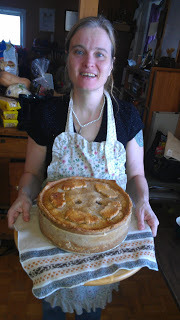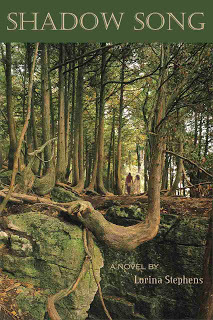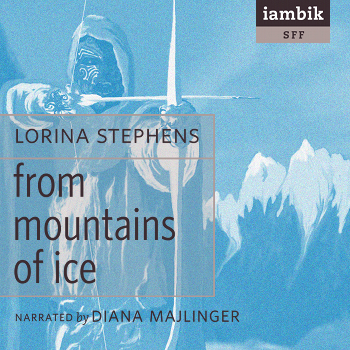Lorina Stephens's Blog, page 55
February 15, 2013
Aaron Kite wins a Watty
You can read more about his success on his blog.
And more about the Watty here.

February 13, 2013
Michelle Enzinas to publish 16th century cookbook with Five Rivers
When we heard about a project on which Michelle Enzinas was working, we discussed her research with her, and the result of that is a publishing agreement.
Michelle Enzinas has spent 15 years as an historical re-enactor and amateur domestic technologies archaeologist, and 20 years dealing with food allergies and research into food security issues. An avid wrestler, she claims much of her cooking is an extension of her interest in self-defence.
Previously Michelle has self-published a medieval cookbook, as well as a series of cooking columns in historical re-enactment journals and newsletters. She has a bachelor of science in psychology from Acadia University.
Michelle lives in Ottawa, Ontario, where her experimental cooking is enjoyed by her husband, and eyed suspiciously by her daughter.
The book, The Annotated Henry Butte's Dry Dinner, is an experimental archaeological study of Henry Butte's 16th century cookbook (which originally examined food combinations and their impact upon health according to the theory of humours). Enzinas brings to this publication her own painstaking empirical and academic studies and experiments, which expands into flora and fauna of the area and period, cooking technologies, and comparison of Butte's book to other contemporaneous works. All models in any of the photographic work in the book will be attired in appropriate late 16th century, commoner's costume.
The Annotated Henry Butte's Dry Dinner, is slated to release early in 2016.

Michelle Enzinas
presenting one of her fabulous great pies

February 10, 2013
Present Company Excepted, Of Course
Okay, some demotivational columns worth reading:
Notes from the Drunken Editor: You Are the Joke Here
Nobody gives a F*** that you wrote something
Besides being Editor-in-Chief at Five Rivers Publishing, I (Robert) also do freelance development editing. The funny thing about being a development editor is that I can divide most of the authors that cross my desk into one of two categories: highly talented writers who are too shy and (unrealistically) dissatisfied with their work to seek publication (and who need a writing coach mostly for moral support), and aspiring writers who have no idea how bad their work is (who need a writing coach to tell them to go back to the drawing board and never ever let the current manuscript see the light of day). The former are a lot easier to work with, but the latter often do quite well if they can put their egos aside long enough to take the advice they're given; and if they are willing to undertake repeated revisions, not just first drafts. Sadly, many in the second category just shoot the messenger and fail to make any forward motion. Fortunately, most of those will want to design their own covers too, and so effectively warn buyers away from their self-published novels. (see http://lousybookcovers.tumblr.com/.)
I'm egotistical enough to think I can help any writer get better...but I do occasionally tell writers that they are so far from their goal that paying for developmental editing would not be cost effective for them at this time; that they need to go back a couple of steps: perhaps take some writing courses, join a writers' workshop, start over on a different novel or two, before trying to bring the current manuscript up to publishable standards.
Even when I get very promising manuscripts across my desk, it helps the editorial process -- the process of ensuring the manuscript reaches its fullest potential -- when the writer starts with a little humility. Thus the demotivational references above. Get a little perspective before demanding that others love your manuscript....
But don't read those columns if you fall into the first group; that is, someone who worries that their manuscript is not good enough. If you are worried that no one will want to read your book, these guys aren't talking to/about you.

February 8, 2013
Thoughts on awards
It doesn't seem to matter if the literary award is the Giller or the GG, the Booker or the Nobel, or lesser known regional awards to be found in every geographic region imaginable. All awards are merely an opinion poll, sometimes well-considered, sometimes not. And it would seem literary awards, not unlike film industry awards (in particular the Academy Awards), are not necessarily indicative of recognition of the best. What they are indicative of is the best marketing strategy.
Heresy? Most likely. But then I've never shied from heretical statements and actions. The very existence of this publishing house if proof enough.
So why do publishers seek out awards for the books and novels they publish? Some will say the bestowal of a major literary award is a direct pipeline to profits, that procuring a Giller or Governor General's award will dramatically increase sales because of the sudden perceived public profile that title receives. And in the short term I can see how that assumption may ring true. Booksellers will want to create luscious displays of award-winning books because, let's face it, there is a bit of a snob in all of us; we like the perceived glamour and prestige that goes along with an award-winning whatever.
I have to wonder, however, 45 days after the hype has died, and major book store chains assess their stock and numbers, how many of those award-winning books get returned? An average novel a publisher originally targets to sell out a print run (say for even figures a run of 3,000), and expects a pretty low return of 20% (or 750 books), might find itself in very perilous logistical and financial waters as a result of snagging a major award.
Just look at what happened to Gaspereau Press the year Johanna Skibsrud's novel, The Sentimentalists, took the Giller. Gaspereau simply could not meet the demand from booksellers. That's what we heard through the media. I have to wonder, however, what happened after the honeymoon? How many copies of The Sentimentalists came sailing back to Gaspereau even a year after they had been sold? (Yes, booksellers do return books a year after having purchased them, and the publisher is expected to give refund in full. I've seen that cripple more than one small press.) And as a result of those returns, what were, in fact, the net sales of that award-winning novel? Add to that many of the major awards require an entry fee, which is earmarked for marketing and promotion of the winning title. In the case of the Giller, that fee is $1500.00.
Now, for a small press, that's no insignificant sum of money, especially in light of the fact many small publishers scramble to come up with $500.00 to support an insignificant award (by comparison) like Canada's Sunburst or Prix Aurora. In fact, I know of several excellent and significant small publishers which, after returns, have realized as little as $250.00 to $500.00 for a year's sales. A year's sales.
Then, as a small publisher, one has to wonder just how likely is it that your titles are going to get a fair and equal hearing as titles submitted by one of the Big Five? Time and time again I watch as colleagues wring their hands and rage at the heavens because not one of their worthy titles makes the long list, let alone the short list, of an award in their field or genre. So, the publisher has not only forked out a sum of money for an entry fee, if there is one, but also thrown more money after that bad by way of cost of books (sometimes up to 10 copies depending on the award), and cost of shipping.
Then I have to ask: Does the average reader really care about literary awards? Do they even know about them? I think you’d be appalled to discover the majority of readers don’t know, don’t care, and just want assurance they have a safe bet of a good read for their bucks. I’ll lay odds that were you to poll readers regarding the SF equivalent of an Academy Award (i.e. the Hugo or Nebula), they’d shrug.
In the end, it’s my belief it's mostly only writers and publishers who care about these awards. Which is sort of like having an award for plumbers published in a plumbing magazine. Who cares but plumbers? Will Mr. Joe care when he goes to hire a plumber that the plumber won the P-Trap Award? Likely not. Mr. Joe wants to know the total price for the job, and does the plumber guarantee his/her work. Nerts to the award.
I suspect it's pretty much the same with book-buyers. Cost is an issue. So if the Big Five price their books too high, Mr. Joe simply isn't going to buy that book until it's on deep discount, which means the book has likely been remaindered because the publisher has cut their losses and are selling off the returned stock just so they don't have to warehouse it and try to find new booksellers. Awards won't make a difference when faced with the reality of the buying public.
And then you only have to look at the books that have hit the blockbuster best-seller lists, breaking all sales records. Did any of the books in the detestable Twilight series win literary awards? Yes, Publishers Weekly's "Best Children's Books of 2005, and School Library Journal's Best Books of 2005. Neither of these awards are of any significance, and neither are likely to have impacted sales that much. Have any of the erotica books in the Grey series won awards? Yes, the Specsavers Book of the Year, which is a popular vote. No surprise there. But, again, one has to wonder what did these awards do to impact sales or further sway public opinion, given the books were already run-away popular reads.
And writers, well, sure writers like to have their egos stroked a bit, which is what the awards thing is all about. It's supposed to be about recognition by your peers. But the award really isn't about recognition by your peers. It's about which house has the best marketing machine that can lobby well enough to sway public opinion, even on a juried board.
All one needs do is look at another arts awards category, the Academy Awards, to see that marketing machine in action. In the history of the Academy Awards two extraordinary actors, arguably the two best male actors of the 20th century, both failed to bring home an Oscar despite being nominated many times. One of those worthies, Richard Burton, was nominated eight times. One year he lost to Lee Marvin for the film Cat Ballou. It leaves any thinking person gob-smacked. And Richard Burton died before any of the Academy woke up and realized one of the power-houses of the industry was no longer with us, to grace us with his art, his presence, his absolute mastery of his discipline.
The other worthy is Peter O'Toole, another dynamo of performance brilliance who was finally given a token recognition in 2003, more like an apology from the Academy, also after eight nominations.
So you see, awards are not about excellence. They are about the opinion of a select group of people, who may, or may not, be swayed by the marketing machine of powerful arts-mongers.
So, does or will Five Rivers chase awards? A few, yes, mostly to please our authors, but without any thought of winning, and certainly without any expectation of financial success. In future years? Not so much. We will, as we have from the outset, seek to redefine what it means to be a publisher, and a more tangible, rational definition of success.

February 1, 2013
Derryl Murphy to release second edition with Five Rivers
There are eleven stories in this collection, ten of them gathered together for the first time and one making its début All of them examine our experience with the worlds around us, anticipating dread and disaster with every turn, even while hope is sometimes allowed to win out. Come witness: the destruction of the Earth; an alien tourist and the death of a species; Earth at the end of time, coming back from a very long trip; a man and his father, lost in time; sailing on seas of garbage; an insect rebellion; a virtual future that creates an unrealistic past; water, politics, and a big machine; monkey-wrenching taken to a new level; lessons in photography; and rebellion on a distant world. Eleven stories that take you into the future even as you wrestle with the present.
Derryl Murphy is the author of the Aurora-nominated urban fantasy/hard science fiction novel Napier's Bones, the collection Over the Darkened Landscape, and the novella (with William Shunn) Cast a Cold Eye. It is often cold where he lives with his wife and sons and dog.
Wasps at the Speed of Sound is scheduled for release late 2013 in both print and eBook.

January 27, 2013
Review: Island of the Lost: Shipwrecked at the Edge of the World

Island of the Lost: Shipwrecked at the Edge of the World by Joan Druett
My rating: 4 of 5 stars
Joan Druett's Island of the Lost is an impeccably researched, well-written, well-presented history of two concurrent wrecks on the Auckland Islands in the late 19th century.
Her easy style balances journalistic integrity with the need to captivate the reader, and holds you from the first paragraph and never lags.
Overall, the stories of these two groups of shipwrecked sailors is a keen contrast between the higher ideals and purposes of humans, and our more base, predatory instincts. In fact, the actions of these real, historical people will both astonish and disgust you.
Oh, and now Auckland Islands is now the second place on earth I would never wish to visit unless I had a death-wish.
View all my reviews
January 9, 2013
Next Big Thing Blog Hop
We all answer the same 10 questions, which allows readers an opportunity to receive a brief overview of either a published work or a work in progress.

1. What is the working title of the book?
This particular novel is called Shadow Song.
2. Where did the idea come from for the book?When I was researching for the book on the Niagara Escarpment my husband and I produced (published by Boston Mills Press), I came across an historical reference to a tragedy in the village of Hornings Mills, which is located at the foot of the Pine River Valley. Several children went missing all at once in the Melancthon Swamp, and their disappearance was blamed on the local natives. That tragedy intrigued me, and became the hook upon which I hung my story.
3. What genre does your book fall under?Historical fantasy.
4. Which actors would you choose to play your characters in a movie rendition?I've been asked that before, and have been completely stumped. I think if ever Shadow Song were to hit theatres, the characters would best be drawn from relatively unknown actors. I just can't see big names portraying these parts.
5. What is the one sentence synopsis of your book?Vengeance in 1830s Upper Canada.
6. What is the longer synopsis of your book?Danielle Michele Fleming, 10 year old daughter of a French aristocratic mother, and the second son of English gentry, finds herself caught in the economic ruin that surrounds the failure of the Bourbon Monarchy. She finds herself aboard ship, destined for the Queen’s Bush of Upper Canada and a life with the catalyst of her doom, her uncle, Edgar Fleming. Relentless in his hunt for her, her uncle has her tracked not only by bounty hunters, but in the end through another shaman of evil intent and a blood-debt to settle with Shadow Song.
7. Will your book be self-published or represented by an agency?I self-published Shadow Song in 2008, and as a result founded a publishing house (Five Rivers Publishing) that now features 22 publications and represents 24 authors.
8. How long did it take you to write the first draft of your manuscript?It took about a year to write the first draft, after about two years of research, and about seven years in total to polish it to the point I felt satisfied enough to publish.
9. Who or what inspired you to write this book?As I wrote earlier, it was the story of a tragedy that occurred in the 1830s in the hamlet of Hornings Mills that formed the inspiration for the novel.
10. What else about your book might pique the reader's interest?Shadow Song is rife with minute historical details taken directly from the area and the period; small things like the cost of a stage coach, the name of the captain with whom Danielle sails to Upper Canada, rituals of the Midewiwin and so forth.
The novel is available in both print and eBook versions through online retailers globally, and will shortly be available as an audiobook through Iambik and Audible.
The Next Big Thing Blog Hop bounces over to Michell Plested on January 16, who has written a delightful YA novel, Mik Murdoch: Boy Superhero.
December 31, 2012
From Mountains of Ice audiobook available for pre-order
 Just thrilled to let my fans know my fantasy novel, From Mountains of Ice, is now available for pre-order from Iambik Audiobooks.
Just thrilled to let my fans know my fantasy novel, From Mountains of Ice, is now available for pre-order from Iambik Audiobooks.Diana Majlinger does a wonderful narration, with her delicious accent (at least to these Canadian ears), adding an exotic flavour to this tale of honour, loyalty and betrayal.
Once at Iambik's site you can listen to the first chapter for free, and then decide from there whether you wish to add From Mountains of Ice to your audio collection.
I'm given to understand the audiobook will be available soon from Audible.com as well.
December 30, 2012
Review: The Palace Job

The Palace Job by Patrick Weekes
My rating: 2 of 5 stars
The Palace Job, by Patrick Weekes, is a quick, easy read that doesn't require anything of the reader other than being awake. It's pure fantasy pulp, a sort of Ocean's Eleven meets horny unicorn, sentient war hammer, and butch-bitch disinherited baroness.
There isn't much here to grab your attention, no remarkable writing, no ingenious plotting. Weekes' attempt to write book from a black perspective is a bit laughable, with a very white-centric focus. There is a social structure and several institutions which are never fully explained or fleshed out so that this reader was unable identify with the fantasy world Weekes' attempts to build. Mostly it's just a lot of fight scenes and reads a bit like a script for an online game, complete with sexual innuendo and adolescent fulfilment.
Based upon this example, I won't be looking for any further works from Weekes, and likely not from Tyche Books either.
View all my reviews
December 28, 2012
Turkey Mango Curry
[image error] Turkey Mango Curry
Turkey Mango Curryolive oil for cooking1 medium onion peeled and roughly chopped4 cloves garlic finely minced1 tablespoon finely minced fresh ginger4 teaspoons good quality curry powder1 teaspoon cumin seed1/2 teaspoon salt1 red pepper, seeded and sliced thinly1 mango peeled, seeded and cubed1 cup leftover spicy cranberry relish (from Stonehouse Cooks, with 1 chilli pepper added, or just use about 1/2 cup coarsely chopped fresh cranberries, 1/2 orange peeled and chopped, 1 tablespoon sugar and 1 small chilli pepper finely minced)1/4 cup mango chutney (India House and Patak's make very good versions)2-3 cups diced leftover turkey meat1 cup coconut milkjuice and zest of 1 lemon1 pint whipping creamgreen onions or fresh cilantro chopped for garnish
In a large skillet heat the olive oil and sauté the first six ingredients until the onions begin to develop a little colour. Add the pepper, mango, relish, chutney and turkey, and sauté for another five minutes. Add the coconut milk and lemon juice and zest. Reduce heat and simmer until liquid reduces by about half (about 10 minutes). Add whipping cream and simmer for another five minutes.
Remove from heat. Spoon into bowls and garnish with green onions or cilantro.
Can also be served over steamed rice.
Serves 4.



